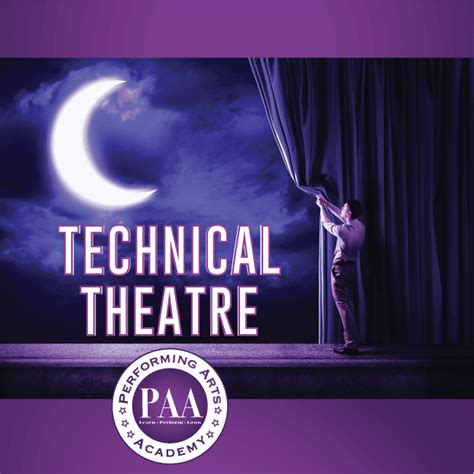The world of theater has undergone a significant transformation in recent years, with technology playing an increasingly important role in the creative process. From enhancing the audience experience to improving production efficiency, technology has become an essential component of modern theater. In this article, we'll delve into the world of tech theater and explore the five essential things to know about this exciting and rapidly evolving field.
What is Tech Theater?

Tech theater, also known as technical theater, refers to the behind-the-scenes aspects of theater production. It encompasses a broad range of disciplines, including lighting, sound, set design, costume design, and special effects. Tech theater professionals work together to create an immersive and engaging experience for the audience, using a combination of traditional techniques and modern technologies.
The Evolution of Tech Theater
The world of tech theater has undergone significant changes in recent years, driven by advances in technology and the increasing demand for more sophisticated and engaging productions. From the early days of theater, when lighting and sound were limited to simple candles and manual sound effects, to the modern era of computer-controlled lighting and sound systems, tech theater has evolved to incorporate a wide range of technologies.
Some of the key technological advancements that have impacted the world of tech theater include:
- Computer-aided design (CAD) software, which has enabled designers to create detailed and accurate models of sets and costumes
- Lighting consoles, which have simplified the process of controlling and programming lighting effects
- Digital sound systems, which have enabled the creation of complex and nuanced soundscapes
- Projection mapping, which has allowed designers to create immersive and interactive environments
Key Disciplines in Tech Theater

There are several key disciplines in tech theater, each with its own unique set of skills and responsibilities. Some of the most important disciplines include:
- Lighting design: This involves creating the lighting plan for a production, including selecting and positioning lights, programming lighting effects, and ensuring that the lighting is safe and efficient.
- Sound design: This involves creating the sound plan for a production, including selecting and positioning sound equipment, programming sound effects, and ensuring that the sound is clear and audible.
- Set design: This involves creating the physical environment for a production, including designing and building sets, selecting materials and textures, and ensuring that the set is safe and functional.
- Costume design: This involves creating the clothing and accessories for a production, including researching and designing costumes, selecting fabrics and materials, and ensuring that the costumes are safe and comfortable.
- Special effects: This involves creating the magic and spectacle of a production, including designing and implementing special effects such as pyrotechnics, smoke, and haze.
The Benefits of Tech Theater
Tech theater offers a wide range of benefits, both for the production team and for the audience. Some of the most significant benefits include:
- Enhanced audience experience: Tech theater enables the creation of immersive and engaging environments, which can enhance the audience's emotional connection to the production.
- Increased efficiency: Tech theater can simplify and streamline the production process, reducing the need for manual labor and increasing the speed and accuracy of setup and strike.
- Improved safety: Tech theater can help to ensure that the production is safe for both the performers and the audience, by reducing the risk of accidents and injuries.
- Increased creativity: Tech theater offers a wide range of creative possibilities, enabling designers and directors to push the boundaries of what is possible and create new and innovative productions.
How to Get Started in Tech Theater

If you're interested in getting started in tech theater, there are several steps you can take:
- Research and learn about the different disciplines in tech theater, including lighting, sound, set design, costume design, and special effects.
- Look for training programs and workshops that can help you develop your skills and knowledge.
- Join online communities and forums to connect with other tech theater professionals and learn about new technologies and techniques.
- Volunteer or intern with a production company or theater to gain hands-on experience and build your network.
Career Paths in Tech Theater
There are many career paths available in tech theater, ranging from entry-level positions to senior leadership roles. Some of the most common career paths include:
- Lighting designer: This involves designing and implementing the lighting plan for a production.
- Sound designer: This involves designing and implementing the sound plan for a production.
- Set designer: This involves designing and building the physical environment for a production.
- Costume designer: This involves designing and creating the clothing and accessories for a production.
- Technical director: This involves overseeing the technical aspects of a production, including lighting, sound, and set construction.
Gallery of Tech Theater






What is the role of a technical director in tech theater?
+The technical director is responsible for overseeing the technical aspects of a production, including lighting, sound, and set construction. They work closely with the production team to ensure that the technical elements are safely and efficiently implemented.
What are some common software programs used in tech theater?
+Some common software programs used in tech theater include AutoCAD, Vectorworks, and Lightwright. These programs enable designers and technicians to create detailed models and plans for sets, lighting, and sound.
How can I get started in tech theater?
+To get started in tech theater, research and learn about the different disciplines, look for training programs and workshops, join online communities and forums, and volunteer or intern with a production company or theater.
In conclusion, tech theater is a dynamic and rapidly evolving field that offers a wide range of creative possibilities and career paths. By understanding the key disciplines, benefits, and career paths in tech theater, you can unlock new opportunities and enhance your skills and knowledge. Whether you're a seasoned professional or just starting out, tech theater has something to offer.
